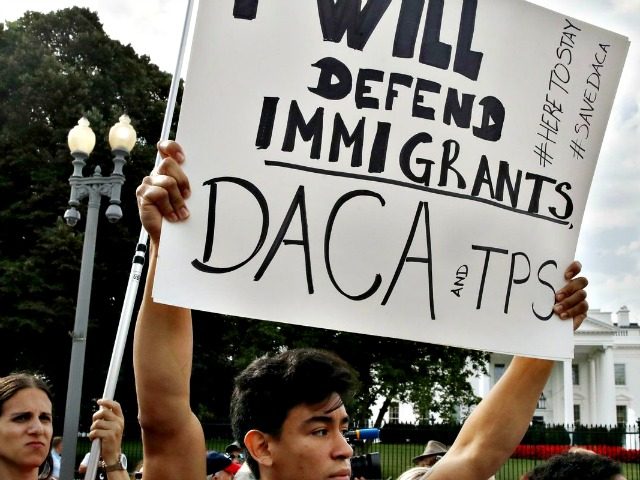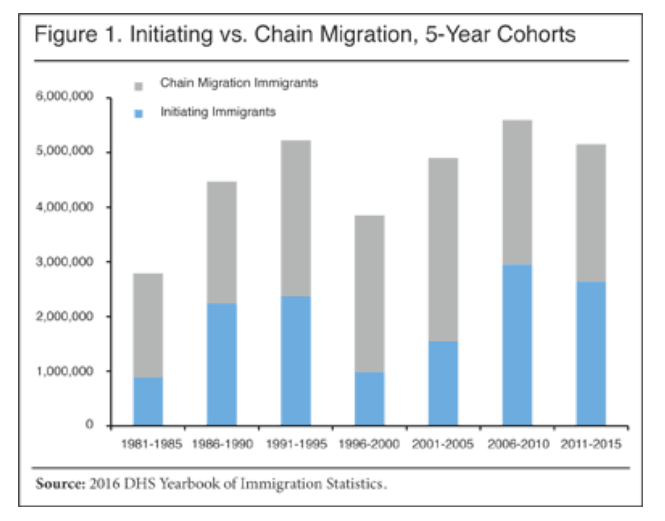The federal government is playing amnesty hardball by ending the 18-year “Temporary Protected Status” for 5,300 Nicaraguans and by setting a six-month date for deciding whether to end TPS for 86,000 Hondurans who have been in the United States since 1999.
The split decision puts more pressure on Democratic legislators and activists to compromise on their nation-changing mass-immigration policy. That policy also demands a no-strings amnesty for 3.3 million so-called ‘dreamer’ illegals, including the roughly 690,000 beneficiaries of the DACA amnesty invented by former President Barack Obama. Democrats also want permanent residency for the total population of 350,000 TPS beneficiaries.
The White House’s political calculus was admitted by a “senior administration official,” who answered a question from Breitbart News during an evening press conference:
I will say that the administration’s intention with this was to look at what the statute required under the law … That being said, the administration understands that there are a number of individuals who have been in a TPS status for –– in the case of Nicaragua potential for 20 years … and given that the lengthy period of their presence here, that Congress may wish to provide a solution that allows them a more permanent status versus this 18-month to 18-month temporary fix [allowed by TPS law] that has been going on for two decades. That is up to Congress, but the administration would support Congress’ efforts to find such a solution …
We’re not going to lay out any negotiating positions on this call tonight, but we hope and encourage Congress to look at this and find a solution.
President Donald Trump has already announced the gradual end of the DACA program for 690,000 current beneficiaries and has repeatedly said he expects the Democrats to agree to halt chain migration and the visa lottery program as part of any negotiations.
By dangling the offer of a permanent residency for the 350,000 migrants, — plus the 690,000 DACA beneficiaries — Trump is taking a political risk by forcing the Democrats to pick one of two bad choices.
The Democrats’ choice would be to accept limits on chain-migration in exchange for some form of residency for the illegals — or else continue to demand a no-strings amnesty while watching the illegals be sent home.
Democrats don’t want to give up chain-migration because that would roughly halve the annual inflow of migrants and so wreck their mostly successful strategy of gaining political dominance by importing government-dependent voters.
But the negotiation strategy is risky for Trump too. The GOP’s base opposes amnesty — especially for the larger population of 12 million illegals — and wants the President to enforce the nation’s immigration laws and so send the 12 million illegals back to their foreign hometowns.
In general, industry-funded “nation of immigrants” polls show that Americans want to welcome migrants. But “fairness” polls show that voters put a much higher priority on helping their families, neighbors and fellow nationals get decent jobs in a high-tech, high-immigration, low-wage economy. That political power of that higher priority was made clear in November 2016 when Americans put Trump in the White House.
The 86,000 Hondurans were permitted to remain in the United States in 1999 after Hurricane Mitch hit the country. Because of the six month extension, they can remain in the country pending a formal decision in July 2018. Regulations require that decision to be announced in May. The November 6 official statement complies with the law, which says the agency must announce its decision 60 days prior to the formal decision.
The 5,300 Nicaraguans also were given TPS status in 1999 because of Hurricane Mitch. They must now return home by January 2019 or be deemed illegal immigrants who are eligible for forced repatriation.
According to an agency statement:
Based on the lack of definitive information regarding conditions on the ground compared to pre-Hurricane Mitch, the Acting Secretary has not made a determination at this time, thereby automatically extending the current TPS designation for Honduras for six months – through July 5, 2018.
… it is possible that the TPS designation for Honduras will be terminated at the end of the six-month automatic extension with an appropriate delay.
Recognizing the difficulty facing citizens of Nicaragua – and potentially citizens of other countries – who have received TPS designation for close to two decades, Acting Secretary Duke calls on Congress to enact a permanent solution for this inherently temporary program.
By the end of November, DHS must decide whether to extend TPS for 50,000 Haitians. They were given TPS because of a huge earthquake that killed 200,000 people in 2010.
In early January, the DHS must also decide whether to extend TPS status for 200,000 people from El Salvador, who were permitted to stay in 2001 after their country was hit by earthquakes.
Left-wing groups are already trying to keep the large populations of TPS-holders in the United States. In an article headlined “TPS Holders Are Integral Members of the U.S. Economy and Society,” the Center for American Progress claimed that “TPS holders are essential contributors to the U.S. economy and society.”
But TPS holders are generally unassimilated and uncompetitive in the U.S. economy, and their departure from the labor market will increase pressure on U.S. companies to raise Americans’ wages and to invest in more labor-saving machinery.
A 2017 study of TPS holders, published in the Journal on Migration and Human Security, reported on people from El Salvador, Honduras, and Haiti, saying:
The five leading industries in which TPS beneficiaries from these countries work are: construction (51,700), restaurants and other food services (32,400), landscaping services (15,800), child day care services (10,000), and grocery stores (9,200) …
Ten percent of El Salvadoran, nine percent of the Haitian, and six percent of the Honduran TPS beneficiaries are married to a legal resident …
Eighty-seven percent of the TPS population from these countries speaks at least some English, and slightly over one-half speak English well, very well, or only English…
Median household income was $50,000 for Salvadorans, $40,000 for Hondurans, and $45,000 for Haitians. In 2015, US median household income was about $56,000
To keep the TPS-holders in the United States, Democrats argue that they have 273,200 U.S.-born citizen children, and argue that remittances from TPS-holders help their home economies.
Four million Americans turn 18 each year and begin looking for good jobs in the free market.
But the federal government inflates the supply of new labor by annually accepting 1 million new legal immigrants, by providing almost 2 million work-permits to foreigners, by providing work-visas to roughly 500,000 temporary workers and doing little to block the employment of roughly 8 million illegal immigrants.
The Washington-imposed economic policy of mass-immigration floods the market with foreign labor, spikes profits and Wall Street values by cutting salaries for manual and skilled labor offered by blue-collar and white-collar employees. It also drives up real estate prices, widens wealth-gaps, reduces high-tech investment, increases state and local tax burdens, hurts kids’ schools and college education, pushes Americans away from high-tech careers, and sidelines at least 5 million marginalized Americans and their families, including many who are now struggling with opioid addictions.
The cheap-labor policy has also reduced investment and job creation in many interior states because the coastal cities have a surplus of imported labor. For example, almost 27 percent of zip codes in Missouri had fewer jobs or businesses in 2015 than in 2000, according to a new report by the Economic Innovation Group. In Kansas, almost 29 percent of zip codes had fewer jobs and businesses in 2015 compared to 2000, which was a two-decade period of massive cheap-labor immigration.
Americans tell pollsters that they strongly oppose amnesties and cheap-labor immigration, even as most Americans also want to favor legal immigrants, and many sympathize with illegals. Because of the successful cheap-labor strategy, wages for men have remained flat since 1973, and a growing percentage of the nation’s annual income is shifting to investors and away from employees.


COMMENTS
Please let us know if you're having issues with commenting.